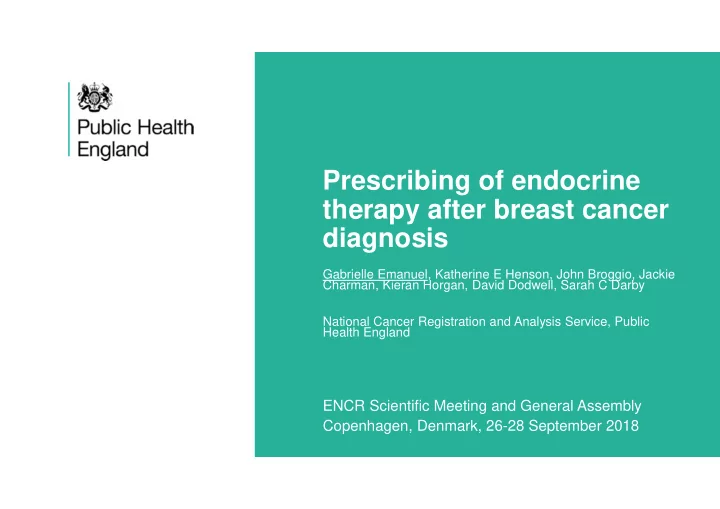

Prescribing of endocrine therapy after breast cancer diagnosis Gabrielle Emanuel, Katherine E Henson, John Broggio, Jackie Charman, Kieran Horgan, David Dodwell, Sarah C Darby National Cancer Registration and Analysis Service, Public Health England ENCR Scientific Meeting and General Assembly Copenhagen, Denmark, 26-28 September 2018 Public Health England. National Disease Registration.
Endocrine therapy (ET) in breast cancer • Standard treatment for patients with oestrogen receptor positive (ER+ve) breast cancer • Guidelines recommend prescribing for five years • Aromatase inhibitors recommended for post-menopausal women • Prescribing in primary care: Initiated in a hospital setting Repeat prescriptions issued in primary care • Access to prescriptions data for the whole of England has been limited Aim: Test the application of the prescriptions data by evaluating the level of ET prescribing in women with breast cancer in England. Endocrine therapy after breast cancer diagnosis Public Health England. National Disease Registration. 2
Prescriptions data Cancer registry data April-July 2015 1995-2015 29 million individuals 7 million patients 332 million prescriptions Women with malignant breast cancer in England 1 st January 1995 and 31 st July 2015 No other cancers Alive during the reference period (April-July 2015) 369,280 patients Women with malignant breast cancer with a prescription for ET 137,792 patients (37%) Endocrine therapy after breast cancer diagnosis Public Health England. National Disease Registration. 3
Drugs included Endocrine therapy drugs included: • Anastrozole • Toremifene Citrate Aromatase • Letrozole • Aminoglutethimide inhibitors • Exemestane • Goserelin Acetate • Tamoxifen Citrate • Megestrol Acetate • Fulvestrant • Medroxyprogesterone Acetate Endocrine therapy after breast cancer diagnosis Public Health England. National Disease Registration. 4
Methods Endocrine therapy prescribing was analysed by: ER status: • ER positive (ER+ve); ER negative (ER-ve); ER borderline; ER unknown Time since diagnosis • Age: • Calculated as of April 2015 (due to missing data) Co-prescribed drugs • For early stage breast cancer patients diagnosed after July 2010 Co-prescribed defined as therapies prescribed within the same four months (April-July 2015). Endocrine therapy after breast cancer diagnosis Public Health England. National Disease Registration. 5
The cohort • 369,280 women with breast cancer diagnosed during the years 1995-2015. • 37% were prescribed ET during the reference period of April-July 2015: • 69% ER+ve • 42% ER borderline • 23% ER unknown • 5% ER-ve o 25% ER-ve and progesterone receptor positive o Data quality issue in the cancer registry o Data quality issue in the prescriptions data • The highest proportion of prescriptions was for tamoxifen (34%) and aromatase inhibitors (64%). Endocrine therapy after breast cancer diagnosis Public Health England. National Disease Registration. 6
ET prescriptions by ER status and time since diagnosis 100% Percentage of patients prescribed endocrine therapy 90% 80% 70% 60% 50% 40% 30% 20% 10% 0% <5 years 5-9 years 10-14 years 15+ years Time since diagnosis (years) ears E ER +ve ER borderline ER -ve ER unknown Public Health England. National Disease Registration. 7
ET prescriptions by time since diagnosis – ER+ve patients 100% Percentage of patients prescribed endocrine therapy 90% 88% 90% 87% 85% 80% 71% 70% 59% 60% 50% 42% 40% 24% 27% 30% 16% 16% 13% 20% 11% 12% 8% 8% 10% 7% 8% 10% 7% 0% ≤ 1 1 2 3 4 5 6 7 8 9 10 11 12 13 14 15 16 17 18 19 Time since diagnosis (years) Public Health England. National Disease Registration. 8
Tamoxifen prescriptions by age – ER+ve patients 100% Percentage of patients prescribed endocrine therapy 90% 80% 70% 60% 50% 40% 30% 20% 10% 0% 16-24 25-39 40-44 45-49 50-54 55-59 60-64 65-69 70-74 75-79 80-84 85-89 90+ Age on 1st April 2015 (years) Public Health England. National Disease Registration. 9
Aromatase inhibitor prescriptions by age – ER+ve patients 100% Percentage of patients prescribed endocrine therapy 90% 80% 70% 60% 50% 40% 30% 20% 10% 0% 16-24 25-39 40-44 45-49 50-54 55-59 60-64 65-69 70-74 75-79 80-84 85-89 90+ Age on 1st April 2015 (years) Public Health England. National Disease Registration. 10
Co-prescribed drugs - In early stage ER+ve women diagnosed between 2010 and 2015 Co-prescribed with aromatase inhibitors • Oral bisphosphonates – 22% of patients Co-prescribed with ET • Analgesics (opioid and non-opioid) – 27% of patients • Statins – 24% of patients • Aspirin – 9% of patients • Oral hypoglycaemics – 7% of patients • Anticoagulents – 4% of patients Public Health England. National Disease Registration. 11
Conclusions 1) •Guidelines recommend ET be prescribed for five years and in accordance to a woman’s menopausal status. •90% received ET prescriptions during the second year after diagnosis. •Prescribing dropped more than five years after diagnosis. •The majority of younger women (under 55) received tamoxifen. •The majority of older women (55+) received aromatase inhibitors. •Oral bisphosphonates and analgesics were co-prescribed as a result of side effects associated with cancer treatment. Endocrine therapy after breast cancer diagnosis Public Health England. National Disease Registration. 12
Conclusions 2) • Before the linkage, ET prescribing in women with breast cancer in England could not be reliably captured for the entire population. •Prescribing was as expected from clinical practice. •This study provides confidence in the use of the prescriptions data for epidemiological purposes. •Prescriptions data can be used to study long-term cancer therapies which are not hospital based. Endocrine therapy after breast cancer diagnosis Public Health England. National Disease Registration. 13
Acknowledgements •This work uses data provided by patients and collected by the NHS as part of their care and support. • Key contributors • Dr Katherine Henson • John Broggio • Jackie Charman • Dr. Kieran Horgan • Prof. David Dodwell • Prof. Sarah C Darby • Special Thanks • NHS Business Services Authority • Public Health England Endocrine therapy after breast cancer diagnosis Public Health England. National Disease Registration. 14
Recommend
More recommend